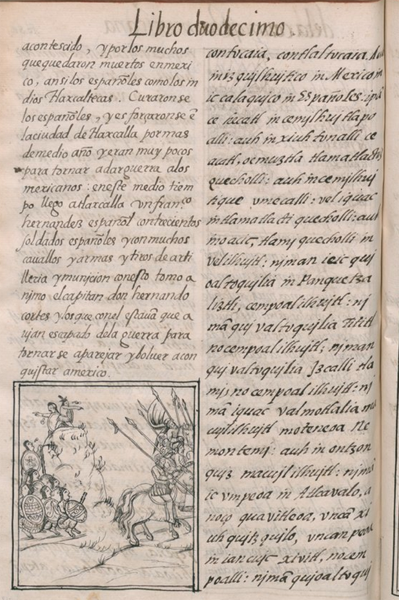Folio 50 verso
Translations and Transcriptions
Spanish Translation
[Translation of the Nahuatl into Spanish by Fr. Bernardino de Sahagún; transcription of the Spanish (left-hand column) by James Lockhart:] [f. 50v.] acontescido, y por los muchos que quedaron muertos en mexico, ansi los españoles como los indios Tlaxcaltecas. Curaronse los españoles, y enforçaronse ē la ciudad de Tlaxcalla por mas de medio año y eran muy pocos para tornar a dar guerra a los mexicanos: en este medio tiempo llego a tlaxcalla vn franco. hernandez español con trecientos soldados españoles y con muchos cauallos y armas y tiros de artilleria y municion con esto tomo animo el capitan don hernando cortes y los que con el estauā que auian escapado de la guerra para tornarse aparejar y boluer a conquestar a mexico.
English Translation
[Translation of the Nahuatl (right-hand column) by James Lockhart:] they buried them, buried them in the ground. Here are the days that have passed since the Spaniards entered Mexico on the day count One Wind and the year count One Reed, one day before the tenth day of [the month of] Quecholli. When they had been here a day, it was Two House, exactly the tenth day of Quecholli. And on the very day that the end of Quecholli arrived, Panquetzaliztli followed after it, for twenty days; then Tititl followed it, also for twenty days; then Izcalli, the end [of the year], followed, also for twenty days. Then at that time were put five days called Nemontemi, and at the end of the five days began Atl cahualo, or Quahuitl ehua, when the year is taken hold of and the new year begins, also twenty days; then followed [Translation of the Spanish (left-hand column) by James Lockhart:] and for the many who had been left dead in Mexico, Spaniards as well as Tlaxcalan Indians. The Spaniards healed their wounds and gathered strength in the city of Tlaxcala for more than half a year. There were too few of them to give battle to the Mexica again. During this interval a Francisco Hernández, Spaniard, arrived in Tlaxcala with three hundred Spanish soldiers and many horses, weapons, pieces of artillery, and munitions. With this, Captain don Hernando Cortés and those who were with him, having escaped from the war, took courage to outfit themselves again and conquer Mexico back.
Analytic Transcription
[Transcription of the Nahuatl (right-hand column) by James Lockhart:] [f. 50v.] contocaia, contlaltocaia. Auh in izquilhuitico in Mexico inic calaquico in Españoles: ipā ce hecatl in cemilhuitlapoalli: auh in xiuhtonalli ca acatl, oc muztla tlamatlactiz Quecholli: auh in cemilhuitique vme calli: vel iquac in tlamatlacti quecholli: auh in oacic, tlami quecholli in vel ilhuitl: nimanie ic quioaltoquilia in Panquetzaliztli, cempoalilhuitl: nimā quivaltoquilia Tititl no cempoalilhuitl; niman quivaltoquilia Izcalli tlami, no cempoalilhuitl: nimā iquac valmotlalia macuililhuitl moteneoa Nemontemi: auh in ontzonquiz macuililhuitl: nimā ic vmpeoa in Atl cavalo, anoço quavitl eoa, vncā xiuhquitzquilo, vncan peoa in iancuic xivitl, no cempoalli: nimā quioaltoqui
Image

Spanish Translation
[Translation of the Nahuatl into Spanish by Fr. Bernardino de Sahagún; transcription of the Spanish (left-hand column) by James Lockhart:] [f. 50v.] acontescido, y por los muchos que quedaron muertos en mexico, ansi los españoles como los indios Tlaxcaltecas. Curaronse los españoles, y enforçaronse ē la ciudad de Tlaxcalla por mas de medio año y eran muy pocos para tornar a dar guerra a los mexicanos: en este medio tiempo llego a tlaxcalla vn franco. hernandez español con trecientos soldados españoles y con muchos cauallos y armas y tiros de artilleria y municion con esto tomo animo el capitan don hernando cortes y los que con el estauā que auian escapado de la guerra para tornarse aparejar y boluer a conquestar a mexico.
English Translation
[Translation of the Nahuatl (right-hand column) by James Lockhart:] they buried them, buried them in the ground. Here are the days that have passed since the Spaniards entered Mexico on the day count One Wind and the year count One Reed, one day before the tenth day of [the month of] Quecholli. When they had been here a day, it was Two House, exactly the tenth day of Quecholli. And on the very day that the end of Quecholli arrived, Panquetzaliztli followed after it, for twenty days; then Tititl followed it, also for twenty days; then Izcalli, the end [of the year], followed, also for twenty days. Then at that time were put five days called Nemontemi, and at the end of the five days began Atl cahualo, or Quahuitl ehua, when the year is taken hold of and the new year begins, also twenty days; then followed [Translation of the Spanish (left-hand column) by James Lockhart:] and for the many who had been left dead in Mexico, Spaniards as well as Tlaxcalan Indians. The Spaniards healed their wounds and gathered strength in the city of Tlaxcala for more than half a year. There were too few of them to give battle to the Mexica again. During this interval a Francisco Hernández, Spaniard, arrived in Tlaxcala with three hundred Spanish soldiers and many horses, weapons, pieces of artillery, and munitions. With this, Captain don Hernando Cortés and those who were with him, having escaped from the war, took courage to outfit themselves again and conquer Mexico back.
Analytic Transcription
[Transcription of the Nahuatl (right-hand column) by James Lockhart:] [f. 50v.] contocaia, contlaltocaia. Auh in izquilhuitico in Mexico inic calaquico in Españoles: ipā ce hecatl in cemilhuitlapoalli: auh in xiuhtonalli ca acatl, oc muztla tlamatlactiz Quecholli: auh in cemilhuitique vme calli: vel iquac in tlamatlacti quecholli: auh in oacic, tlami quecholli in vel ilhuitl: nimanie ic quioaltoquilia in Panquetzaliztli, cempoalilhuitl: nimā quivaltoquilia Tititl no cempoalilhuitl; niman quivaltoquilia Izcalli tlami, no cempoalilhuitl: nimā iquac valmotlalia macuililhuitl moteneoa Nemontemi: auh in ontzonquiz macuililhuitl: nimā ic vmpeoa in Atl cavalo, anoço quavitl eoa, vncā xiuhquitzquilo, vncan peoa in iancuic xivitl, no cempoalli: nimā quioaltoqui
Image
